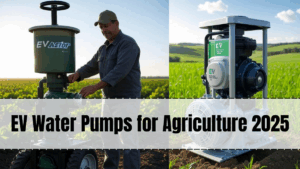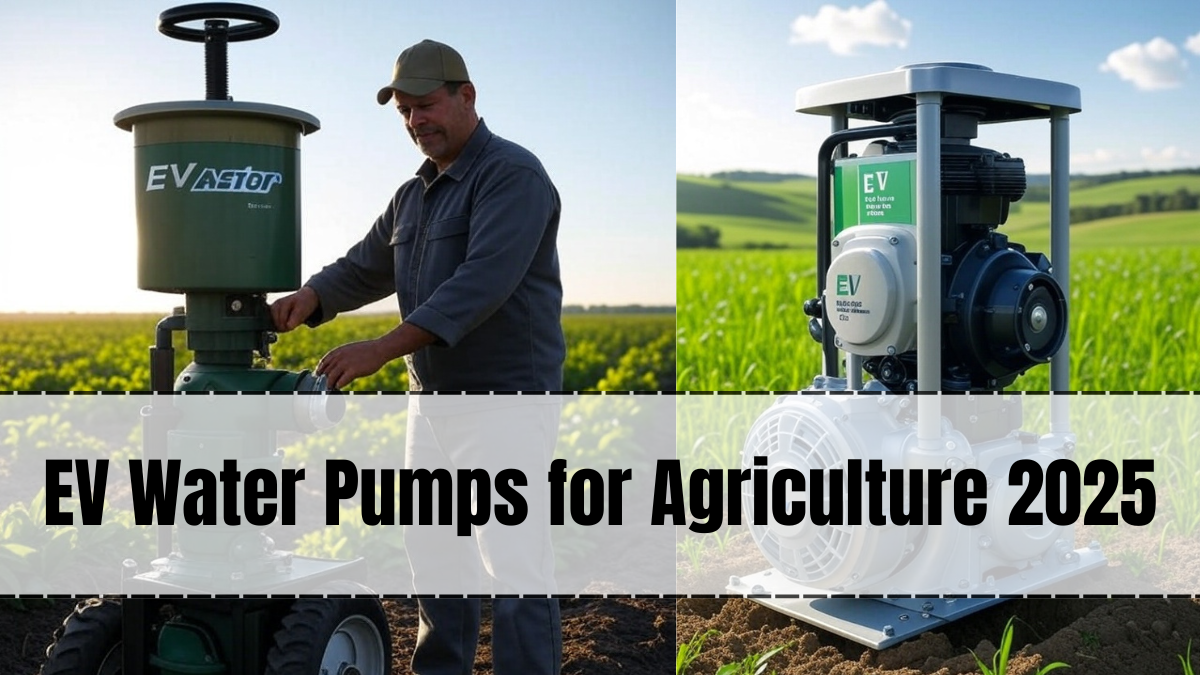In 2025, the Indian agriculture sector is embracing a significant shift toward cleaner energy with the introduction of EV water pumps. These electric-powered pumps, often run on renewable energy sources like solar, are designed to replace traditional diesel-powered pumps. With the government’s focus on sustainability and cost reduction for farmers, EV water pumps for agriculture are quickly gaining popularity.
This transformation is a part of India’s larger push toward green technology in farming, where irrigation and water management play a central role. By combining renewable energy and modern technology, these pumps provide farmers with an affordable, eco-friendly, and efficient solution.

Why EV Water Pumps Are the Future
Traditional diesel pumps have long been the backbone of farm irrigation. However, rising fuel prices, high maintenance costs, and environmental concerns have led to the search for alternatives. EV pumps bring multiple benefits:
-
Lower Operating Costs – Electricity, especially from renewable energy, is cheaper than diesel.
-
Eco-Friendly Operation – No emissions, reducing pollution in rural areas.
-
Less Maintenance – Fewer moving parts compared to diesel engines.
-
Integration with Renewable Energy – Solar-powered EV pumps make irrigation independent of grid power.
The adoption of EV water pumps for agriculture 2025 aligns perfectly with India’s renewable energy and carbon reduction targets.
Government Initiatives in 2025
To accelerate the shift, the government has introduced several schemes in 2025 to promote EV water pumps:
-
Subsidy Programs – Farmers receive up to 50% subsidy for installing electric or solar-powered pumps.
-
Renewable Energy Integration Grants – Financial aid for linking EV pumps with solar panels.
-
Easy Loan Facilities – Low-interest loans under agricultural development schemes.
-
Awareness Campaigns – Training sessions on operating and maintaining EV pumps efficiently.
These measures aim to make irrigation not just more affordable, but also environmentally responsible.
Technology Behind EV Water Pumps
Modern EV pumps are equipped with advanced features that make them reliable and user-friendly:
-
Brushless DC Motors (BLDC) – Improve efficiency and reduce wear.
-
Smart Controllers – Adjust pump operation based on water levels and crop requirements.
-
Solar-Grid Hybrid Systems – Allow pumps to run on solar during the day and switch to the grid when needed.
-
IoT Integration – Enables farmers to monitor and control pumps remotely via mobile apps.
These innovations are helping farmers move toward renewable energy-driven irrigation with minimal disruptions.
Economic Impact for Farmers
The EV water pumps for agriculture 2025 initiative has a direct impact on farmers’ earnings:
-
Reduced Fuel Expenses – Savings of thousands of rupees annually by eliminating diesel costs.
-
Lower Maintenance – Minimal servicing needs lead to long-term savings.
-
Increased Productivity – Reliable irrigation ensures better crop yields.
-
Access to Government Benefits – Subsidies and incentives further reduce the total cost of ownership.
In many rural regions, farmers have reported recovering their investment within two to three years of switching to EV pumps.
Challenges in Adoption
While the benefits are clear, there are still hurdles to widespread adoption:
-
High Initial Cost – Even with subsidies, the upfront investment may be a barrier for small farmers.
-
Limited Awareness – Many are unaware of the long-term cost savings.
-
Infrastructure Gaps – Some areas lack stable electricity or renewable energy setups.
-
Training Needs – Farmers need guidance on using smart irrigation controls effectively.
Addressing these challenges will require stronger policy support, awareness drives, and partnerships between technology providers and farmer cooperatives.
Future Outlook
The future of EV water pumps for agriculture looks promising. Expected developments include:
-
100% Solar-Powered Pumps – Fully off-grid systems for remote farms.
-
AI-Based Water Management – Automatic adjustments based on soil moisture and weather forecasts.
-
Battery Storage Solutions – Ensuring irrigation during non-sunny hours.
-
Micro-Financing Models – Making EV pumps accessible to even the smallest farmers.
These innovations will make irrigation more sustainable, efficient, and affordable for millions of farmers.
Final Thoughts
The EV water pumps for agriculture 2025 initiative represents a powerful combination of irrigation technology and renewable energy. By reducing diesel dependency, lowering costs, and supporting sustainable farming, these pumps are set to transform rural water management.
With government backing, private sector innovation, and growing farmer awareness, EV pumps will play a central role in shaping the future of Indian agriculture — ensuring higher productivity, lower environmental impact, and a stronger rural economy.
FAQs
What is an EV water pump?
An EV water pump is an electric-powered pump used for farm irrigation, often run on renewable energy like solar.
How are EV pumps better than diesel pumps?
They are cheaper to run, require less maintenance, and have zero emissions.
Does the government provide subsidies for EV water pumps?
Yes, in 2025 farmers can get up to 50% subsidy along with easy loan options.
Can EV pumps work without electricity from the grid?
Yes, many models run on solar power, making them ideal for off-grid locations.
How long does it take to recover the investment in an EV pump?
Most farmers recover their investment within 2–3 years through fuel and maintenance savings.
Click here to know more.
